Intel Nears $9bn Deal to Sell Altera Chip Unit to Silver Lake

In a significant move within the technology sector, Intel Corporation is reportedly close to finalizing an agreement to sell its Altera chip unit to the private equity firm Silver Lake. This development comes as Intel, a long-standing leader in the semiconductor industry, seeks to bolster its financial resources and enhance its competitive position against rivals such as Nvidia, particularly in the burgeoning field of artificial intelligence (AI) chip manufacturing.
Sources familiar with the negotiations indicate that Silver Lake plans to acquire a majority stake in Alteraa company known for producing programmable chips that can be customized by technology firms to meet their specific AI requirements. The valuation for this deal is estimated to be around $9 billion, highlighting the substantial worth of semiconductor technology in the current market landscape.
Intel has been exploring the possibility of divesting non-core assets for several months, and selling Altera is part of this broader strategy. Despite the impending sale, Intel intends to retain a significant minority stake in the unit, thereby allowing the company to maintain some level of involvement in Altera's future operations.
Earlier this year, Intel entered into exclusive negotiations with Silver Lake after determining that the private equity firm possessed a viable plan to turn around Altera's fortunes and enhance its overall value. Ken Hao, the chairman of Silver Lake, is at the forefront of this acquisition, recognized as one of the most astute investors in the semiconductor space. His experience dates back over two decades when he played a pivotal role in establishing what is now known as Broadcom by extracting a semiconductor business from Hewlett-Packard.
Intel's history with Altera dates back to 2015 when the tech giant acquired the company for approximately $17 billion. Intel executives have previously communicated to shareholders that a stake sale would elevate the chipmakers valuation and potentially pave the way for a complete divestiture in the future.
While both Intel and Silver Lake are expected to make an official announcement regarding the deal in the coming days, it is important to note that discussions are still ongoing, and the negotiations could ultimately fall through.
As part of its strategic overhaul, Intel is actively working to divest non-essential assets in order to strengthen its financial position. This move is crucial as the company aims to invest billions of dollars into the construction of state-of-the-art chip fabrication facilities in the United States and Europe. Earlier this year, Intel signaled its intent to spin off its venture capital arm, Intel Capital, further demonstrating its commitment to streamlining operations.
This asset sale is not just a financial maneuver; it reflects a broader restructuring initiative at Intel, especially in light of ongoing discussions with the U.S. administration regarding potential partnerships with industry leader Taiwan Semiconductor Manufacturing Company (TSMC). These conversations are crucial as President Donald Trumps administration explores ways to revitalize Intel, a key player in the development of Silicon Valley's technology landscape.
In a bid to address its financial challenges, Intel has also implemented drastic cost-cutting measures. This includes laying off thousands of employees and halting various manufacturing projects across Europe, particularly as its chip foundry division has been operating under significant financial strain, reporting multibillion-dollar losses.
The situation took a notable turn in December when Intel's board of directors made the decision to oust its then-CEO Pat Gelsinger, amid growing concerns that the company was lagging behind competitors like Nvidia and AMD in innovation and market responsiveness. In a significant leadership change, veteran investor and former Cadence chief executive Lip-Bu Tan was appointed to the position last month.
The financial instability facing Intel has raised alarms within Washington, as the company stands out as the only major U.S. chipmaker capable of manufacturing high-end semiconductor products. As the negotiations with Silver Lake continue, the industry will be watching closely to see how these developments unfold, particularly given Intel's historical significance in the tech sector.
This report includes additional insights from Michael Acton in San Francisco.
























